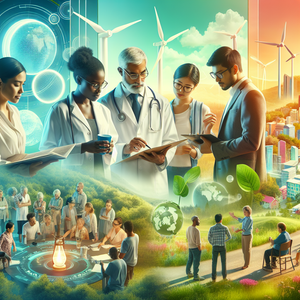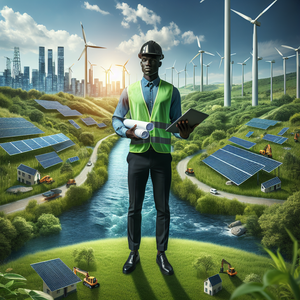The Rise of Climate-Savvy Entrepreneurs: Innovating for a Sustainable Future

Historically, the business world has often placed profit above sustainability, with practices that prioritized short-term financial gains at the expense of long-term environmental health. However, as awareness of the climate crisis has grown, this mindset is rapidly changing. Today, sustainability is no longer a fringe concern but a central tenet of modern business strategy. Climate-savvy entrepreneurs are at the forefront of this shift, proving that a commitment to environmental stewardship can coexist with — and even enhance — economic success. The rise of these entrepreneurs is driven by several converging factors. Consumers are demanding eco-friendly goods and services, governments are introducing stricter environmental policies, and investors are increasingly prioritizing green ventures. In this evolving landscape, addressing environmental challenges is no longer optional — it is essential for businesses to remain competitive. Entrepreneurs are harnessing this momentum to create innovative solutions, from renewable energy technologies to waste reduction initiatives, fundamentally transforming industries and setting new standards for sustainable business practices.
Real-World Examples of Climate-Savvy Entrepreneurs
The impact of climate-savvy entrepreneurs is best illustrated through their groundbreaking ventures. These innovators are leading by example, demonstrating how bold ideas can generate both environmental and economic benefits. Patagonia, a leader in outdoor apparel, has long been a shining example of how businesses can integrate sustainability into their core operations. Through initiatives like the "Worn Wear" program, the company encourages customers to repair and recycle their clothing, reducing waste and promoting a circular economy. Beyond Meat, founded by Ethan Brown, offers plant-based meat alternatives that mimic the taste and texture of animal protein, addressing the climate impact of traditional food production. Loliware, co-founded by Chelsea Briganti and Leigh Ann Tucker, provides edible and biodegradable alternatives to plastic straws and cups, tackling plastic pollution. Solar Sister, founded by Katherine Lucey, empowers women in rural Africa to distribute solar-powered lamps and clean cooking solutions, reducing carbon emissions and creating economic opportunities.
Why Climate-Savvy Entrepreneurs Are Thriving
The rise of climate-savvy entrepreneurs is fueled by a combination of cultural, technological, and economic factors. Advances in technology have made sustainable solutions more feasible and scalable, from affordable solar panels to biodegradable materials. Public awareness of climate issues has surged, leading consumers to prioritize eco-friendly products and services. Meanwhile, investors are increasingly channeling funds into green startups, recognizing the potential for both financial returns and environmental impact. A key driver of this movement is the passion and purpose that climate-savvy entrepreneurs bring to their work. For many, their ventures are deeply personal — a way to address pressing global challenges while leaving a positive legacy. This sense of mission not only motivates these entrepreneurs to overcome obstacles but also resonates with consumers, investors, and partners who share their values.
Challenges to Overcome
Despite their growing influence, climate-savvy entrepreneurs face significant challenges. Many sustainable solutions come with higher upfront costs, which can deter price-sensitive consumers and limit initial scalability. Navigating complex regulatory landscapes, which vary widely across regions, can also pose hurdles to growth. Additionally, these entrepreneurs often compete with established players that may have greater resources but lack the same commitment to sustainability. However, these challenges are not insurmountable. Collaboration among stakeholders — including governments, investors, and consumers — can help create an ecosystem that supports green innovation. Policies that incentivize sustainable practices, such as tax breaks for renewable energy startups or penalties for excessive waste, can level the playing field. Similarly, greater consumer education on the long-term benefits of sustainable products can drive demand and encourage widespread adoption.
A Skillset for the Future: Environmental Stewardship
The rise of climate-savvy entrepreneurs highlights the increasing value of environmental stewardship as an in-demand skill. In a world grappling with climate change, the ability to integrate sustainability into business practices is becoming a critical competency. Entrepreneurs who understand and prioritize environmental impact are not only better positioned to succeed in the green economy but also play a key role in shaping a sustainable future. Moreover, this shift extends beyond entrepreneurship. Companies across industries are seeking professionals who can implement eco-friendly strategies, measure carbon footprints, and innovate sustainable solutions. As the global economy evolves, environmental stewardship is poised to become a cornerstone of professional success, offering opportunities for individuals and organizations to contribute meaningfully to the planet’s well-being.
The rise of climate-savvy entrepreneurs represents a profound transformation in the way businesses approach environmental issues. These trailblazers are proving that profitability and sustainability are not mutually exclusive but deeply interconnected. By addressing pressing global challenges with creativity and determination, climate-savvy entrepreneurs are paving the way for a more resilient and equitable future. As consumers, investors, and policymakers, we have a crucial role to play in supporting this movement. By choosing sustainable products, advocating for green policies, and fostering a culture of innovation, we can amplify the impact of climate-savvy entrepreneurs and ensure that their efforts lead to lasting change. Together, we can build a world where business is a force for good — one that not only thrives economically but also safeguards the planet for generations to come.
Sustainability Consultant
Deloitte, Ernst & Young (EY), or boutique sustainability firms like BSR (Business for Social Responsibility)
Core Responsibilities
Assess and optimize a company’s environmental impact by analyzing operations, supply chains, and energy usage.
Develop and implement sustainability strategies, such as carbon reduction plans, waste management systems, and renewable energy adoption.
Conduct sustainability audits and prepare reports for stakeholders, including compliance with regulations like ESG (Environmental, Social, and Governance) standards.
Required Skills & Experience
Expertise in environmental science, corporate sustainability, or a related field.
Strong analytical skills to evaluate data and recommend actionable solutions.
Familiarity with frameworks like GRI (Global Reporting Initiative) or CDP (Carbon Disclosure Project).
Renewable Energy Project Manager
Siemens Gamesa, Orsted, Tesla, or regional renewable energy providers
Core Responsibilities
Oversee the planning, development, and execution of renewable energy projects, such as solar farms, wind turbines, or energy storage systems.
Manage budgets, timelines, and regulatory approvals to ensure project success.
Coordinate with engineers, contractors, and policymakers to meet technical and environmental standards.
Required Skills & Experience
Background in engineering, environmental science, or project management.
Experience with renewable energy technologies and knowledge of grid integration.
Strong understanding of local and international energy regulations.
Circular Economy Specialist
IKEA, Unilever, Loop, or consulting firms focused on circular economy transitions
Core Responsibilities
Design and implement strategies that promote circular economy principles, such as reuse, recycling, and product lifecycle extension.
Collaborate with product design teams to create sustainable, modular, or biodegradable products.
Analyze waste streams and identify opportunities to recover materials or minimize resource consumption.
Required Skills & Experience
In-depth knowledge of waste management systems, material sciences, and supply chain logistics.
Ability to quantify economic and environmental benefits of circular practices.
Experience working with manufacturers or consumer goods companies.
Climate Tech Software Engineer
Climate tech startups like Watershed, Patch, or large firms like Microsoft’s Sustainability division
Core Responsibilities
Develop software platforms that track, measure, and optimize carbon footprints, energy consumption, or resource efficiency.
Work on algorithms and data analytics tools to model climate impact scenarios or predict energy usage trends.
Collaborate with environmental scientists to integrate sustainability metrics into digital tools.
Required Skills & Experience
Proficiency in programming languages like Python, Java, or R, with experience in data visualization tools.
Familiarity with climate modeling, GIS (Geographic Information Systems), or IoT (Internet of Things) technology.
Strong problem-solving skills to address sustainability challenges through technical solutions.
Environmental Policy Analyst
World Resources Institute (WRI), United Nations Environment Programme (UNEP), or local government agencies
Core Responsibilities
Research and evaluate the impact of existing and proposed environmental policies on industries, communities, and ecosystems.
Advise governments, NGOs, or private companies on regulatory compliance and policy adoption to meet sustainability goals.
Develop white papers or policy briefs to communicate findings to stakeholders and decision-makers.
Required Skills & Experience
Strong background in environmental law, public policy, or economics.
Ability to synthesize complex technical data into actionable policy recommendations.
Experience working in government agencies, think tanks, or advocacy organizations.


